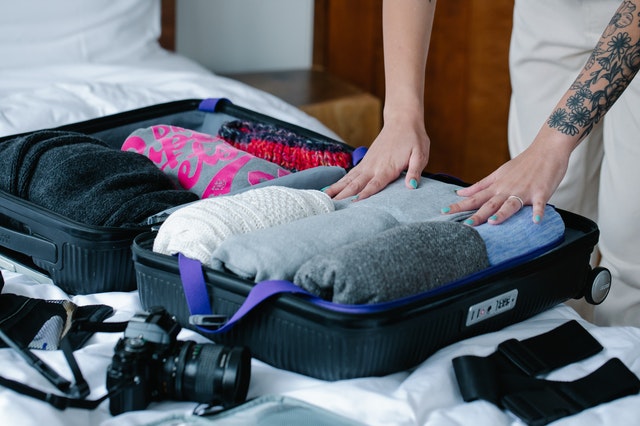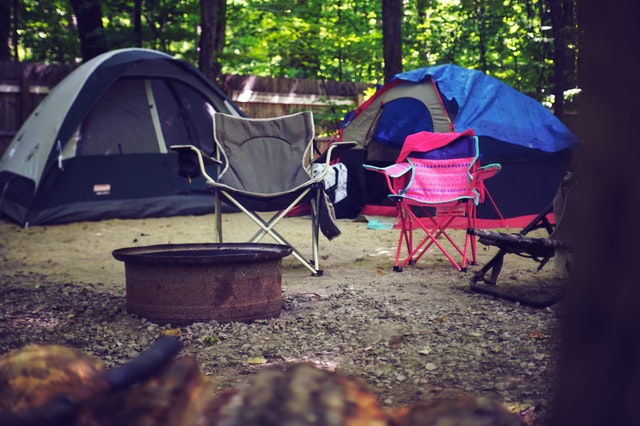
by pankaj | Sep 19, 2022 | Travel Tips
Traveling mistakes are very common. These mistakes turn your mesmerizing vacation into a nightmare. You need to make proper planning, whether you are traveling within the country or abroad. Although travelers always pre-plan their journey no one knows what holds throughout the vacation. Keeping this in mind, we have prepared five common mistakes to avoid by travelers during planning their vacation.
- Overpacking
Overpacking is the most common mistake done by everyone. One should always travel light. You can make a list of items you need and check the weather forecast. Also, if you stick to the particular list, you will have much space in the bag for the shopped items from that place.
- Not Buying Travel Packages
Travelers should include travel packages in their tours. They offer a lot of benefits and services like accommodations, hotel transportation, and destination tours. Travel packages also offer travelers security in case of delays and cancellations happen along the way. The service provider can rearrange transportation or pay the clients if unwanted things happen.
- Packed Itinerary
Another mistake made by travelers is they wanted to explore everything in a limited time. But it is not practical to visit much in a limited time. You may not enjoy all the destinations to the fullest extent. So, rather create a flexible itinerary and list random experiences and activities of that particular place.
- Eat food in famous restaurants
Having breakfast, lunch, or dinner in any famous restaurant is not only expensive, but it will also be crowded. So, instead of having food in expensive restaurants, eating local cuisine in a local restaurant is always a better idea. It will also save you money.
- Not carrying all your required documents
It can prove to be the biggest mistake by travelers. If you are traveling to any international destination, it is a must to carry all the required documents with you. Also, cross-check if your passport is valid in the country. Make sure to check all the requirements before you visit another country.

by pankaj | Sep 16, 2022 | Travel Tips
Want to have a traveling break, but thinking that travel can be expensive may cancel your plan? But if you plan your trip according to our guide you will definitely save a lot of money while traveling. A planned trip saves the amount of money than an unplanned trip. So, here we are with some easy tips on how you can save money while traveling.
- Opt for Off-Season
Traveling in the off-season is our number one tip. If you travel in the high season, the price of everything like accommodation, tours, and even food will be higher. So, to save money you can prefer going in the off-season where you will find much difference in the price. You will find cheap hotels, ferry discounts, and half-price tours if you opt for the off-season.
- Set your Intention
The next thing is to set your intention. It is very important to have a clear idea of where you want to go and what you want to do in saving money while traveling. To set your intention you can take out your dairy and pen and make notes of it.
- Plan your Travel Budget
So, when you are done with setting your travel intention the next step is to plan your budget. Check out how much your traveling tour will cost you. Here you can consider local transportation, accommodation, food and drink, and leisure expenses.
After making a rough idea of your budget, check your monthly budget and see how long it will take to save up some money. If you find that you can not save money in this section do not worry. Other tips below will help you.
- Eat like the locals and trip like the locals
The next thing to remember is wherever you go, try to eat like how the locals eat and travel like how the locals travel. Eating in the local restaurants, shopping at local restaurants, roaming around in local transportation saves you lots of money, and also you will get a much more authentic experience.
- Stay where Breakfast is Included
Kill two birds with one stone by staying in places where breakfast is included in the staying price. It is also fine if breakfast is not included. In such cases, you can go to local restaurants and eat items like bread, and fruit to save a lot of your money.

by pankaj | Sep 15, 2022 | Vacations & Leisure
While rental apps undoubtedly simplify the process to reserve a family vacation property, they can also make it nearly too simple. After all, it just takes a few taps and swipes on an app to get a rental house. Therefore, it’s crucial to avoid a few typical errors. The following are five mistakes to avoid while renting a vacation home.
- Misunderstanding the Location
Check the location and accessibility of the attractions you want to visit in your holiday property as defined in the listing. Ask if there are any unique requirements since many rental platforms withhold the exact address until you book out of respect for your privacy.
- Judging a Place by Photos Alone
Just as you shouldn’t judge a book by its cover, you shouldn’t book a rental by its pictures. Take the time to review all the amenities the rental house has to offer, despite the temptation to make a reservation based solely on the images. Before making a reservation, it can help you manage expectations and provide information.
- Not Using a Major Platform
There have been many instances of fraud and scams involving vacation rentals, thus it is preferable to search for a reputable property management company’s website or well-known travel companies with a procedure for checking properties and hosts. Additionally, the safest method of payment is via credit card.
- Not Looking at Recent Reviews
The majority of platforms allow for two-way reviews, with hosts and guests both giving feedback on the other. The most useful source of information about how your stay will be found in community comments, particularly more recent reviews. We constantly advise visitors to check the reviews because they’ll provide the most current, relevant information to make sure their experiences live up to their expectations.
- Expecting Hotel-like Services
Know what you’re getting into when renting a vacation home because, like hotels, they differ in quality and facilities from trailers and tree huts to mansions and villas. Setting expectations for everyone is crucial because there won’t be daily housekeeping and no turndown service.
- Not Checking Out Properly
Make sure to read the house rules before checking out because they vary for every vacation rental. The owner may not need you to wash the sheets and make the bed before you depart, but they may ask you to load and run the dishwasher or put any relocated furniture back in its original location. When you check out, keep in mind that the pantry and refrigerator must be empty.

by pankaj | Sep 15, 2022 | Travel Tips
Are you traveling on lengthy flights? You may feel bored, uncomfortable, and exhausted whether you are taking a seven-hour tour to Europe or undertaking a 19-hour journey of the world’s longest flight.
The problems of long-haul travel can range in harshness from annoying seatmates to downright dangerous. An unclear planned journey can ruin your day. Fortunately, we have listed ten easy tips to bear a long flight. Read on!
- Book your Tickets Early
Without waiting and hoping for the price drop, it is better to book your tickets at the earliest. As the earlier you book the tickets, the better your chances of picking your favorite seat.
- Book Back Seat
If your favorite seat is no more available, book the back seat. However, it will be noisier, but if everyone prefers the front seat, you have a far better possibility of ending up with an empty seat or two beside you.
Furthermore, keep an eye on the seat map before you fly if there are any empty seats you can get at the last minute.
- Get Creative
So, if your flight is long hours, you get to use it as an opportunity. You can carry the notebook with you, a sketch pad, or anything else you are interested in.
- Stay Hygienic
Stay hygienic is important for everyone. So, try to carry your own toiletries and ensure to brush up your teeth, put on some deodorant, and even you can change your clothes to be hygienic.
- Bring your Best Conversation
Long flights can be very boring. So, never hesitate to start a conversation with your fellow seatmate. If you are likely to be seated next to an interesting and friendly fellow, strike up a conversation.
- Walk to Keep the Blood Flowing
Passengers who travel in pressurized cabins may have symptoms such as weariness, headaches, swelling limbs, and dehydration over time as a result of decreasing blood oxygen levels. The most ideal activity is to Stretch. To increase blood flow, walk up. You can also perform some quiet exercises in your seat, such as rolling your shoulders and turning your ankles.
- Wear the Most Comfortable Outfit
When it comes to long-haul flights, pick a “comfy-chic” dress code of neutral, loose-fitting layers you feel comfortable in. Experts also suggest wearing compression socks, which decrease swelling and reduce the risk of blood clots.
- De-stress Before you Arrive
Before you go on a long journey, it is necessary to have a nice breakfast, go to the gym, or for a walk. It is important for every traveler to feel relaxed.
- Don’t Overpack the Carry-ons
A long-haul journey will demand more of you than a short-haul flight would, but that doesn’t mean it’s too overpack. Keep your essentials in your personal item so you can always access them.
- Bring your Own Pillow
The basic carry-on item for long-distance passengers is a small pillow. Travel pillows are available almost everywhere at airports, and appearing a little foolish is a minor price to pay to avoid damaging your neck.

by pankaj | Apr 29, 2022 | Destinations, international, International Destinations, Tips, Travel Tips, vacations
Learn how to assess security concerns when traveling to more “exotic” destinations and keep safe.
Some travelers maintain that tourist travel to certain countries is unsafe and to be avoided. At the same time, other travelers insist that such travel is safe.
Who, then, can a potential traveler believe? Every traveler is different and has varying travel interests and tolerance levels for risk.
Even within the same country, security concerns may vary widely as well. Before considering travel abroad, it is important to carefully evaluate possible security concerns for a particular destination, while keeping in mind your travel style and willingness to adapt to local ways.
Official Travel Warnings
Before considering travel to a particular country or location, it is advisable to check a variety of sources. This way, the potential traveler can compare the different security concerns that are expressed about a specific country.
A major reliable source of information about the security and safety situations of countries around the world are the dedicated travel sections of government-run foreign affairs offices like the United States’ Department of State, the United Kingdom’s Foreign Office, and Australia’s Department of Foreign Affairs and Trade. All three offices offer frequently-updated country specific information, travel warnings, and travel advice on their respective websites.
As government bureaus that watch out for their citizens’ safety and interests, the Department of State, the Foreign Office, and the Department of Foreign Affairs and Trade have access to a wide range of sources in the creation of these documents. However, some critics have expressed concern that certain travel warnings may be politically motivated.
Information From Other Travelers
Other travelers can be a great source of information. They may have recently gone exactly where you are thinking of going or they may have some first-hand information that is not readily available in guidebooks. On the other hand, they may have picked up unreasonable or unwarranted opinions or prejudices. The rule of thumb when seeking the advice of other travelers is to gain as much information as possible, but to take it with a grain of salt.
Online travel forums are an easy way to find other travelers who may be eager to share their travel experiences with you. Politely asking curious questions is a good way to get the conversation started. Alternatively, you may know someone in your extended circle of contacts who has gone to the place you are researching. You may ask them to coffee so that you can pick their brains.
Mode of Travel
How one travels can impact one’s level of safety and is an important consideration to keep in mind. For example, in a country where Westerners have been known to be targets, Western tourists traveling in a large group may constitute a security concern in certain areas. Traveling as a small group may attract less attention, but as a smaller group – or even those who travel individually – tend to be more approachable, they may be more susceptible to harassment or worse from unsavory elements of the local population.
Whether traveling as a large group, a small group, or individually, it is important to anticipate and balance current security concerns in the city and country you wish to travel to with the mode of travel you choose. If in doubt, contact your country’s local embassy or consular section for advice and information about the latest conditions.
Fitting in Promotes Safety
In general, travelers who try to respect the local customs through their dress, actions, and speech have a greater chance of ensuring their personal safety. As an illustrative example, a gay couple may openly kiss on the streets of Berlin, Germany; however, that couple would risk death for the same behavior on the streets of Riyadh, Saudi Arabia. A woman who dresses modestly and a tourist who speaks the local language are appreciated in many countries, or at least it may help the traveler to draw less attention to him or himself.
In certain cases a traveler will be immediately recognizable as a foreigner or tourist, such as black people in Russia or white ones in India, or if you are unable to speak the local language, which may draw unwanted attention, but attempting to emulate local dress, actions, and speech may make a positive difference in how the traveler is perceived or treated. So, read a book on the country’s customs. Take a language course. Put together a modest wardrobe.
Keeping Safe
To be safe, it is important to assess the conditions and safety concerns in the city and country you are considering travel to. Get as much information and evaluate it as you can, you need to carefully look at it, you can make an informed travel decision and have a good holiday while avoiding a potential tragedy.

by pankaj | Apr 29, 2022 | Vacations & Leisure
Ideas and tips for what to do before the first camping trip with kids. Practical tips include preparation and what to bring.
One of the favorite vacations for children is to go camping. Boys may belong to the Boy Scouts or girls to the Girl Scouts, so this can become a frequent vacation for the family. However, camping as an adult is a very different thing than camping as a child. Adults who have not camped before, or only been camping as a child, may be unprepared for the amount of work required to go tent camping. These tips will help make the first experience as enjoyable as possible.
1. Consider the age and personalities of your children.
Camping involves being in the dark, bugs, walking to the bathroom and waiting for things to happen. Food may take longer to make and won’t taste the same as it does at home. All of these new experiences may thrill some kids who can’t wait for more and other kids may be less enthusiastic. Some of these obstacles are readily solved with the addition of a battery-operated nightlight and mosquito spray. Bring little games and activities for children who are too young to engage in camp responsibilities. This could mean helping with gathering firewood, setting the table or straightening up the tent.
2. Choose the best type of campground for your family.
Campgrounds vary widely in amenities. If you have young children, a playground next to the campsites can be important as the kids can play while the adults are busy. Other items to look for are indoor bathrooms, showers, a beach and available drinking water. Some resorts may have scheduled activities for kids while others will have toys and watercraft available for use.
3. Choose the right equipment and practice using it before the trip.
Camping can be challenging if you have never had to use a camp stove, had to filter water or put up a tent. Practice camping for a night in your backyard. Put up the tent, lay out the sleeping bags, cook dinner on the camp stove and sleep in the tent. By doing this at home it will not only provide practice so that things go smoother on the trip but also allow the kids to get a taste of adventure. Be sure to feed them the same food that they will get on the camping trip, so if they have a problem eating it you can change the menu before you go. If they have trouble sleeping in the yard because the air mattress isn’t thick enough now is the time to find out, not when you are at the campsite and they are crabby from lack of sleep.
4. Plan the food and activities with the kids.
Some kids will eat anything put in front of them, but many are more particular than that. Have the kids help plan the menu. If you will be car camping, you are only limited by space and what you can fit into an ice chest. Favorites include hot dogs (roasted over an open fire), sandwiches, s’mores and hamburgers. If you are backpacking, it is a good idea to bring peanut butter and jelly for sandwiches.
5. Bring special items from home.
If the kids read a particular story for bed or have a stuffed animal they sleep with, bring them too. Also, carry to bring a deck of cards and a few small games in case of rain. While rain may seem to be a bad thing, many families end up enjoying the time spent together playing card games and relaxing.
Camping as a wonderful way to spend time together as a family and experience the great outdoors. Hiking, fishing, canoeing and stargazing are only a few of the new adventures that await. Plan a trip that best suits your family and you may hear, “Lets do this again!”








